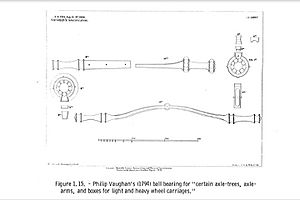Philip Vaughan facts for kids
Philip Vaughan was a clever inventor from Wales. In 1794, he created and patented the very first design for a ball bearing. This invention was a big deal! Vaughan's idea was to put small iron balls between a carriage wheel and its axle. These balls helped the wheels spin easily by making less friction.
What Are Ball Bearings?
Philip Vaughan received a special document called a patent in 1794. This patent protected his new idea for a ball bearing. His design showed how the balls would run inside deep grooves. A stopper would then keep them safely in place.
Today, bearings are super important in almost all machines that have spinning parts. You can find them in cars, bikes, trains, and even airplanes! Modern ball bearings work much like Vaughan's first invention. They help vehicles move better by reducing friction. Without bearings, many of our machines simply would not work.
Philip Vaughan's Life and Work
Philip Vaughan was an ironmaster, meaning he managed iron foundries. He was a owner and manager of ironworks in Carmarthen and Kidwelly. He lived in a house called Green Hall near Kidwelly. He also had a villa on Llangunnor hill.
In 1793, Philip Vaughan married Elizabeth Griffiths. Their wedding took place at St Peter's Church, Carmarthen.
On January 1, 1800, Philip Vaughan signed a special business agreement. He joined with John Morgan Junior, William and Thomas Morris, and William Morgan. They all agreed to invest money together to run the Carmarthen rolling mills. They leased these mills for 21 years. This lease also included other ironworks like Kidwelly Forge and Blackpool Forge.
Philip Vaughan became a special citizen of Carmarthen on October 2, 1797. He passed away in 1824. His son, also named Philip, later became a lawyer and a mayor in Brecon.
 | Dorothy Vaughan |
 | Charles Henry Turner |
 | Hildrus Poindexter |
 | Henry Cecil McBay |


